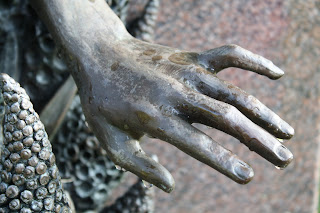And so . . .
Late yesterday afternoon my son and I drove the few hours to my husband's hometown for his brother's retirement party. We stopped at nearby Chautauqua on the way so that I could purchase a gift for another party today and also the Barbara Brown Taylor CDs from the summer - a Sunday morning service, a Sunday evening Vespers service which has become a traditional time in which the preachers of the week to share some of their personal stories, and five weekday services.
BBT is one of the reasons I have just graduated from seminary. She was "introduced" to me a couple of decades ago by one of my stepsisters who was a parishoner of hers in Clarksville GA, and I've heard her preach several times at Chautauqua. I had planned to go for one of the week-day services in July, but found that that beautiful place, with its memories of summer after summer with our children and of the last time there, taking some ashes down to the lake on Thanksgiving night two years ago, was not yet possible for me. I had hoped to make one drive around the grounds yesterday, but it turns out that Chautauqua is also too much for my son.
Car rides with kids, even 26-year-old kids, are great opportunities for conversation. My son shared some of his feelings about this past week and his fears about the party toward which we were headed. I told him that my brother had called to express apprehension about my attendance at this event on this particular week-end.
As it turned out, Matt spent much of the evening settled into a couch with a cousin and some other young men he doesn't know, watching football on tv. I spent most of it sitting around a table with my husband's sisters and their husbands and one of their daughters, who's just started college. I watched the new babies and their families out of the corner of my eye, and here's what I saw:
The babies are beautiful and peaceful and never at a loss for arms in which to be held ~
The young mothers look very happy, a little tired, and at ease in their new roles ~
The grandmothers and great-grandmother are ecstatic ~
It looks (and I recall that it is) much easier to care for one newborn than two, especially when you are surrounded by extended family ~
No one shared birth stories with me, no one tried to hand babies to me, no one mentioned what it was like when there were two babies in the family 26 years ago.
Which caused me to wonder:
Do I exhibit a terrible stillness that renders me unapproachable? Are they sensitive to my feelings? Or are they just scared of the woman whose own baby grew up only to die?
Probably no one even notices. Perhaps it's only me ~ because I am so aware that if Josh were here, I wouldn't be able to get enough of those babies and their mothers.
And so . . .
I am thinking that two years ago I would not have gone near that party. A year ago I would have gone and been outside in tears within five minutes. Last night I made it through three hours and managed, I think, to appear quite normal. (Perhaps when my husband comes home tonight, he will offer a different impression.)
I see that this is a year in which to watch and listen, to absorb and reflect. I wonder at the randomness of it all ~ how my sister-in-law has a happy marriage, a job she enjoys, a beautiful home, three grown children, and now two beautiful grandchildren, and how she smiles and laughs. I wonder how many times I have been, in my own happiness, oblivious to the concealed pain of others. (I am not commenting on my sister-in-law or anyone else ~ only on myself.)
Matt and I spent a lot of our car time talking about how much you share, how much you don't. What does he say to new acquaintances in law school? I am still stunned, he says, that my brother is dead, and by suicide. What do I say to new people, some of whom might become good friends and some not? How do I tell stories about my life?
I tell him that I have no idea. I tell him that one of my best friends is a woman I met on the first day of law school all those years ago, and that she became a person who immediately flew back from California when his brother died and accompanied me to the crematorium. But how would I have predicted any of that when we were young women studying law together? I tell him that some years ago she told me that she remembers in great detail the moment when we were getting to know each other over our morning cookie snack, a few weeks into school, and I told her that my mother had died when I was a child. It was a simple statement of fact for me, a stunning revelation for her. I don't remember the conversation at all; it is burned into her mind. What effect do our words have on people? I am a preacher: I should know the answer to that one. I find that I have no idea.
I tell him that I do not know what to tell, what not.
(This blog, form instance, is probably too much sharing. But in truth it reveals little of the depth of this experience.)
And so . . . watching and listening, and trying to figure out how to live. What to share because it helps me. What to offer because it might help others. What to keep to myself.
Year Three begins.









 E
E










